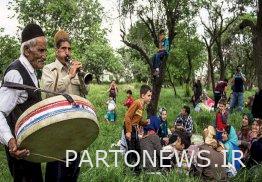Fifty, reconnecting with nature for Thanksgiving and rain

“Panjah-e-Bahdar” is one of the ancient rituals and special customs of Qazvinis for thanksgiving and prayer for rain, which is rooted in the ancient and historical beliefs of the people of this region and the people of Qazvin The name of Mosalla, an area in the southern garden of the city, is gathered and they observe this ancient ritual by holding prayers, supplications, offering vows and setting up colorful evening tables.
It is customary that if there is a lot of rain from the first day of the year to the fiftieth day of the year, people perform the fiftieth prayer in thanksgiving prayer, and if they face the lack of this divine blessing, they raise their hands to the sky and hold prayers and supplications. They ask their Lord for rain and a fruitful and blessed year.
This ritual has a long history and dates back to pre-Islamic times when Anahita worshiped the goddess of water, because Qazvin was a dry and waterless city and a lot of effort was made to supply it with water. It is not a semi-arid climate and there is no need to worry about drought.
In addition to prayers and supplications, this ceremony has a fun aspect, which is similar to the 13th of Bahdar ceremony. In the afternoon of this day, Qazvin’s dinner tables where all kinds of traditional Qazvin sweets and remnants of Eid, fruit, soup, vinegar and Dimaj, the traditional and nationally registered snack of this city consisting of crumbled dry bread, walnuts, vegetables, hot onions and cheese , Arranged in the lap of nature spreads.
One of the programs of this traditional ritual, which is performed by women after performing rain prayers, is to ask for water by removing a few small pieces of stone and then pressing it on the wall of an old reservoir in the place of Mosalla. They have that their needs are met by sticking stones.
Performing instruments, taziyeh, martial arts and all kinds of performing arts, wrestling and traditional arts such as force testing, wrestling, etc. are among the programs that are held in this ceremony and usually it rains or at least damp on these days that the people present at the ceremony are very good. They welcome it and consider it a good and divine sign.
With the setting of the sun on the 19th of Ordibehesht, the people of Qazvin return to their homes after performing a religious ceremony and recreation in the heart of nature. The traditional ritual of Pentecost in Qazvin on February 6, 2011 with the number 185 in the list of intangible national monuments has been registered.
* Report from Mojtaba Abbasi, Anthropologist, General Directorate of Cultural Heritage, Tourism and Handicrafts of Qazvin Province

